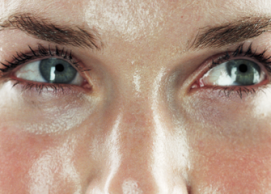What is the treatment?
The condition of oily skin occurs when there is an accumulation of excess oil on the skin, especially the face. This happens when the hyperactive sebaceous glands lead to an overproduction of the oil. Although a particular amount of oil is necessary to maintain skin moisture, too much of oil production could lead to a perpetual state of greasiness and lead to uneasiness and also give rise to pimples, acne and blackheads due to clogging of pores.
Sebaceous glands secrete sebum, an oily substance that does the work of lubricating the skin. This lubrication prevents chances of drying or irritation. When your body is in the process of exercise, sweat is produced and oil secretes along with it. When the oil production is running normal then it can eliminate the dirt, dead skin cells and other pollutants from the skin. However, if there is an overproduction then the excess oil stays on the skin clogging the pores and making the skin look shiny and greasy.
The main factors of oily skin are hereditary, hormone levels, unhealthy diet comprising of an excess of caffeine and fats, stress and excessive use of cosmetic products. Puberty and pregnancy also wreck havoc with your hormone levels which could give rise to oily skin. There are a few ways that you can decipher if you have oily skin; these are- presence of blackheads and breakouts, if your skin is greasy all the time and if your makeup ceases to exist for more than a few minutes.
How is the treatment done?
Oily skin can be treated at home with the help of a few remedies and skin care routines. The skin care routine will require you to regularly cleanse, tone and moisturize the skin. Wash your face at least two-three times a day with a gentle, oil-based cleanser and hot water, especially in the morning and at night before going to bed to clear out the impurities. Next, tone your skin with a gentle, alcohol free toner in order to eliminate the extra oils.
Lastly, end with a light, non-oily, water-based moisturizer that is not comedogenic in nature, meaning it won’t lead to clogging of your pores.
For people with oily skin, scrubbing is absolutely necessary to remove the excess build-up of oil, dirt, dead skin cells and bacteria. Exfoliate your skin at least two to three times a week. People with oily skin should make it a point to apply a SPF to protect the skin from the harsh rays of the sun and prevent any chances of pimple development. Keep your skin clean and free from impurities, round the clock. However, take caution not to cleanse your face more than three times a day, as over-cleansing can remove all the oil leading the skin to manufacture more oil to make up for the loss. When buying skin care products try to look for ones that contain ingredients such as salicyclic acid, beta hydroxyl acid, glycolic acid or benzyl peroxide.
Who is eligible for the treatment? (When is the treatment done?)
Anyone suffering from oily skin problems should consider doing this skin care regime regularly to prevent breakout of pimples, acne and any other skin infection.
Who is not eligible for the treatment?
People with extremely sensitive skin or those suffering from any dermatological skin conditions are not eligible. These people should consult with their dermatologist and try to use special medicated skin care products.
Are there any side effects?
Not caring for your skin in the right way or using the wrong products, products that do not compliment your skin type can lead to skin breakouts such pimples, acne and cause life-long blemishes.
What are the post-treatment guidelines?
Always use a sunscreen when going out. Caring for your skin not only lies at the external level but also internally. Your diet plays a huge role in your skin as well as overall health. Keep yourself hydrated by drinking lots of water and fresh fruit juice throughout the course of the day. Have foods that are high in protein but low in salt, sugar Avoid fatty items such as pork or fried, oil, greasy items. Try to incorporate a lot of green leafy veggies and food that are high in vitamins because the slightest vitamin deficiency can lead to oily skin.
How long does it take to recover?
There is no particular time frame for treatment and healing as this is a continuous process; the skin care regime needs to be carried out daily in order to keep the excess oil production in control.
Are the results of the treatment permanent?
The skin care routine for oil control needs to be carried out every day. It is not a one-time treatment session.
What are the alternatives to the treatment?
If you are not in favour of using cosmetic or medicated products then you can opt for certain home remedies as well as an alternative. These are natural and are equally effective. Applying a mixture of egg whites and lemon helps to tighten up the pores. Also, lemon is antibacterial and absorbs excess oil. Aloe vera gel is used by many people with oily skin as it has soothing properties. Tomatoes naturally contain salicyclic acid therefore, absorbs additional oil. Tomatoes also aide in the process of unclogging pores.



